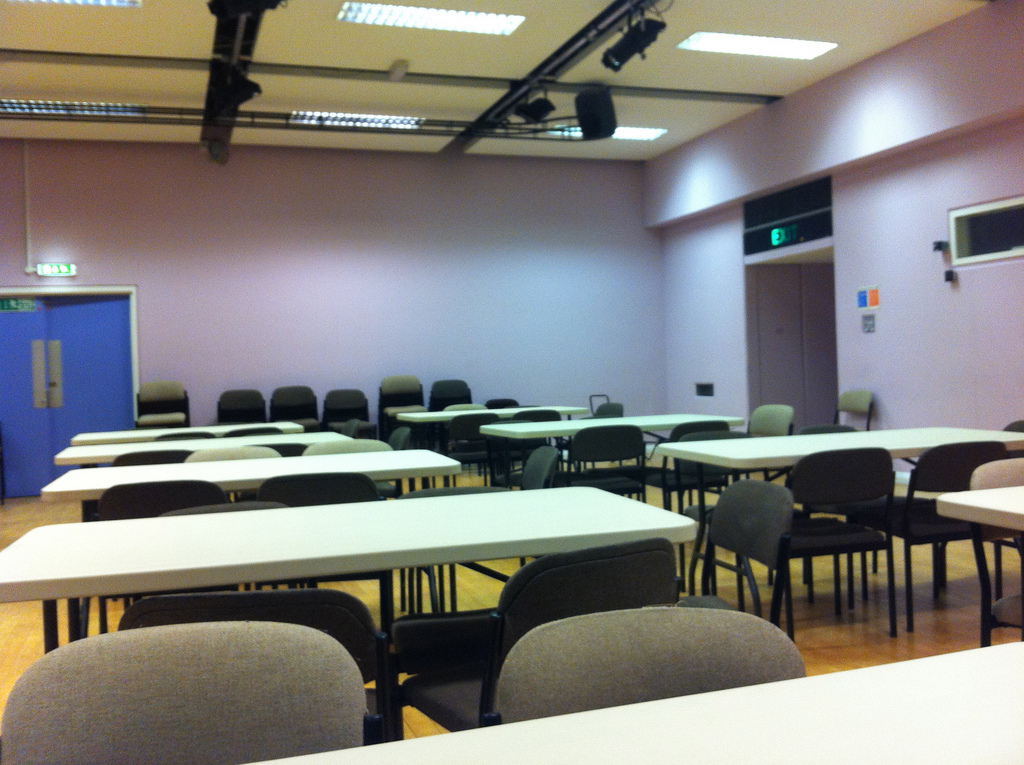
Empty classrooms and other potential educational outcomes
I wanted to wade in to the ongoing discussions surrounding the current situation in higher education involving
- rising tuition/less government investment (seems more pronounced in the UK right now)
- consumer expectation/commodification
- ‘disruption’, outside investment capital, new pedagogical formats (MOOCs et al), shifts, etc.
There is not much that I might add to this discussion that is completely new or profound, but I felt the need to weigh in towards a sense of consensus. This post was triggered by a short Twitter discussion I had with someone whose opinion I respect on the subject of outlandish rhetoric used in educational technology, as well as a few other articles regarding the role of open learning and MOOCs, the rising cost of tuition, and the effects of these shifts on academia in general. All of these changes seem to be swirling a bit and I suspect are beginning to take shape, not unlike the shift from a tropical storm to a hurricane. I am not going to use ‘disruptive’ if at all avoidable, but there are shifts and we should be aware of these.
I should filter these changes through my experiences as a doctoral student at the University of London, but I believe that unfair to focus exclusively on one institution. They are correlated but not causal to the issue at hand. I will break down my comments according to the Tweet that inspired them. They are all subsets of a larger discussion, that of the role of higher education in a changing economic/social/professional landscape, a discussion that requires some (any) holistic thinking as to make sure the tail isn’t wagging the dog. Please feel free to disagree/chime in as needed.
Edtech Rhetoric and Increasing Expectation
https://twitter.com/mseangallagher/status/279140921264701440
This thread started my day yesterday and stayed with me for a long while. Not because of my allergic reaction to edtech marketing jargon, or grandiose claims of ‘revolutionary’ pedagogical shifts, etc., but rather that we are seeing a new mode of communication evolve here. Business and academia live with little to no buffer between them and they are beginning to communicate (they have for a long while, but bear with me). This communication will involve a negotiation of shared vocabulary, a negotiation of what their respective collaborations will look like. So, the revulsion I feel towards this marketing speak is precisely because this negotiation is at its infancy; eventually they will settle on a rhetoric that is palatable. Not because they (business) shifted, necessarily; rather that both business and academia will ‘center’. Interesting process.
But that negotiation is an indication of a larger phenomena, one that needs to be contextualized a bit. If one positions themselves as academia, then we defend those ramparts. If one sees themselves as business (however couched in flowery language), then we see opportunity. If one sees themselves as consumer, the most common position I would argue, we see a marketplace of choice and expectation. A confusing one, for sure, but one with expectations. Many of us float between all these positions. I personally am relatively agnostic about any of these camps. I am not going to demonize business, nor am I going to bullied by it. I am not going to defend higher education in and of itself, but rather what it captures, idealizes, and delivers. Mostly delivers. I am not going to defend the average student as consumer, necessarily (but I will a bit).
I am filtering this through the UK scenario in higher education as it relatively new. Rising costs for the student (involving a liberalization/disinvestment process by the government) creating an environment with few support mechanisms (scholarships/tuition schemes, etc.) to collect the deluge of students set adrift. Students are faced with increased cost precisely at a time when a university degree is offering less professionally. While it would be foolish to focus on higher education solely as a purveyor of professional skills, employability, we would be foolish to ignore when that link from theory to practice (professionally) has been severed or convoluted. And, at least for me, this all boils down to the following maxim. We ignore this at our peril.
Rising Cost=Rising Consumer Expectation
One cannot raise the cost of a product without creating an expectation of a better/larger/augmented product. This is as true for higher education as elsewhere. When we deal with higher education, though, this process has traditionally been muted. Now it is right in the face of the consumer. Costs skyrocketed in the blink of an eye and yet the product remained much the same. This is not the fault of the university per se (especially the UK ones, as they have just started this process and will develop processes on what emerges from these changes), but that doesn’t matter. The cost increases were too high, too fast to go unnoticed. The student expects more and that isn’t an illogical expectation. Nor is the position of higher education necessarily illogical. Nor is the position of business. They are just in conflict with one another. A negotiation will take place in the market (economic, social, cultural), values and language will be redefined, and transitions will be made. Expectations will be aligned (at some point; not anytime soon) and new structures will emerge from all of this. Many students will suffer in this transition as will many universities. Some universities will cease to exist (not the worst thing in the world), some students will pursue alternative means of education. Business, I suspect, will move on to more lucrative markets once they realize that education isn’t always that profitable.
Universities can be proactive about this situation (and some are) and begin to align cost with expectation. Find mechanisms for lowering overhead (and anyone who has set foot on a university campus and interacted with any support staff knows these mechanisms exist); double down on innovative pedagogy and learning environments; zero in on impact. And feel free to embrace the student as consumer; it doesn’t cheapen the respective parties all that much. Like any theoretical framework, it is just a vantage point for defining and solving a problem. It is the only logical one as that is the flow to capitalize on.
Too Much Capital Chasing Too Little
https://twitter.com/mseangallagher/status/279297367969251328
A former colleague, Matthew Rascoff, posted this and I agree wholeheartedly. I am not sure it was intended as such, but I see this as a cautionary tale for business rather than a disastrous lack of good ideas. The capital is flowing in on the expectation of profit at some stage, so business supplies capital to traditional marketplace ‘things’. In this case, technology. It is tangible, it is a product, and it can be sold and resold. I can’t argue with that approach as seen from the investor’s perspective. This isn’t charity.
I see this focus on tangible technology as the larger issue. The real innovation, the real ideas that have merit, sit within process and pedagogy. Of the reorganization of the ‘elements’ of learning. Community, context, process, collaboration, mode. This is the ‘stuff’ of learning and it is slippery and not easily commodified. I am not saying it is impossible in the least. Foundations (and they have their issues as well) fund this sort of thing all the time. New approaches to learning, new environments, new pursuits and mechanisms for distribution of new modes of discourse.
But we are all dazzled by the ‘thing’, that technology, that device, or application. We rarely see the ‘thing’ as a vessel/amplifier of process, but we should. It is the process being filtered through the technology that we need to be concerned with. Presumably, there is little return on investment in ideas as opposed to commodities. But we (learning communities) are in the business of creating foundations for future innovations. We zero in on flow and process, interaction and collaboration. We articulate best practice, structure, and available scaffolds. Need is then extracted from this. Need is business. Flow/process is academia. They speak to each other, but not in the way that it is currently being funded/incentivized. So the capital is chasing too little, or the wrong thing altogether. We create larger economies/environments through community, flow, collaboration. We can build products off of that base. Which transitions into the next point.
Open University and MOOC Platforms
https://twitter.com/mseangallagher/status/279524091600453632
I am happy to see Open University go after this; we needed a non-profit/higher education player in this market to keep everyone honest at the very least. This is a technological response to need. That need takes on many shapes, including
- pedagogical need -universities can experiment with elearning and new learning formats via a format designed by educational professionals (Open University being one of the leading lights in elearning for many many years). This is low-risk, potentially high-impact experimentation. Judging by the list of universities involved, I see little risk involved in this collaboration.
- overhead need-presumably there is potential for a cost benefit. The result of all this open learning, at least one result, is a general downward pressure on price points for education. Universities should be experimenting with cost-saving and resource sharing mechanisms and this platform speaks to that.
- exposure/marketing need- these universities need exposure, brand recognition. Students need to know this is an institution with respect, with value. Platforms like this disseminate brand recognition and loyalty as much as they might disseminate pedagogy and learning opportunities.
I don’t have a pithy conclusion to wrap this post up, but I just wanted to weigh in on these issues as they effect me, they effect most of the people I know, and they are symptomatic of a larger system transforming itself, painfully, before our very eyes.

[…] keeping with my previous post on the changing nature of higher education (apparently in a pragmatic mood this holiday season), I […]